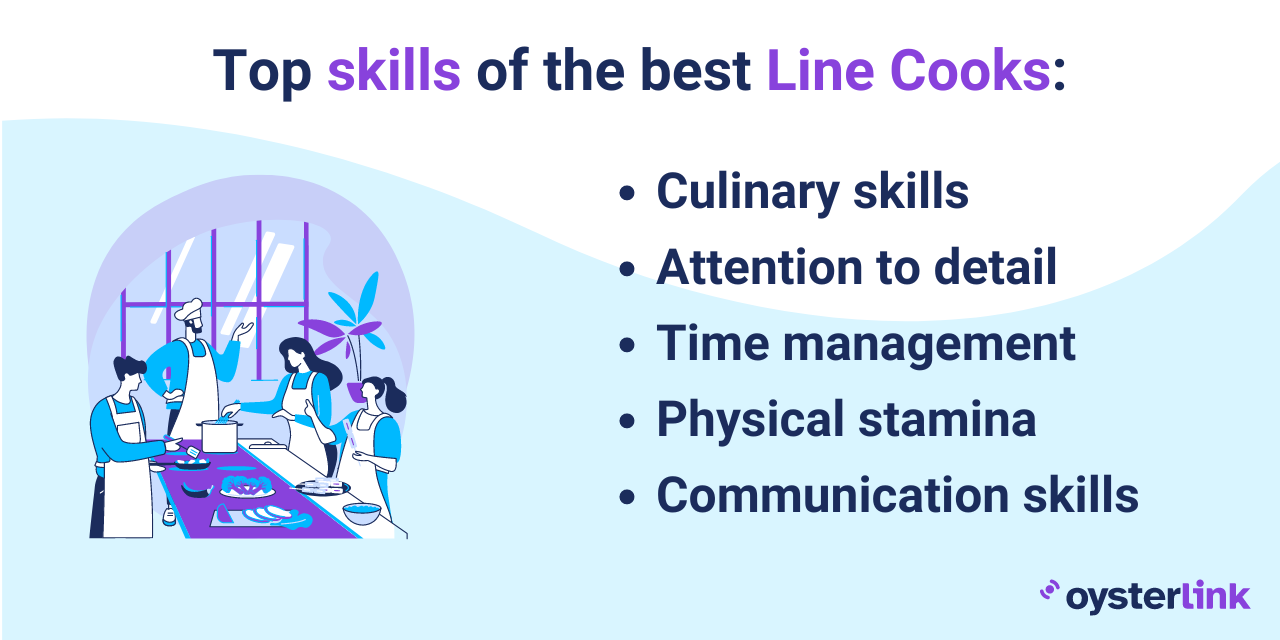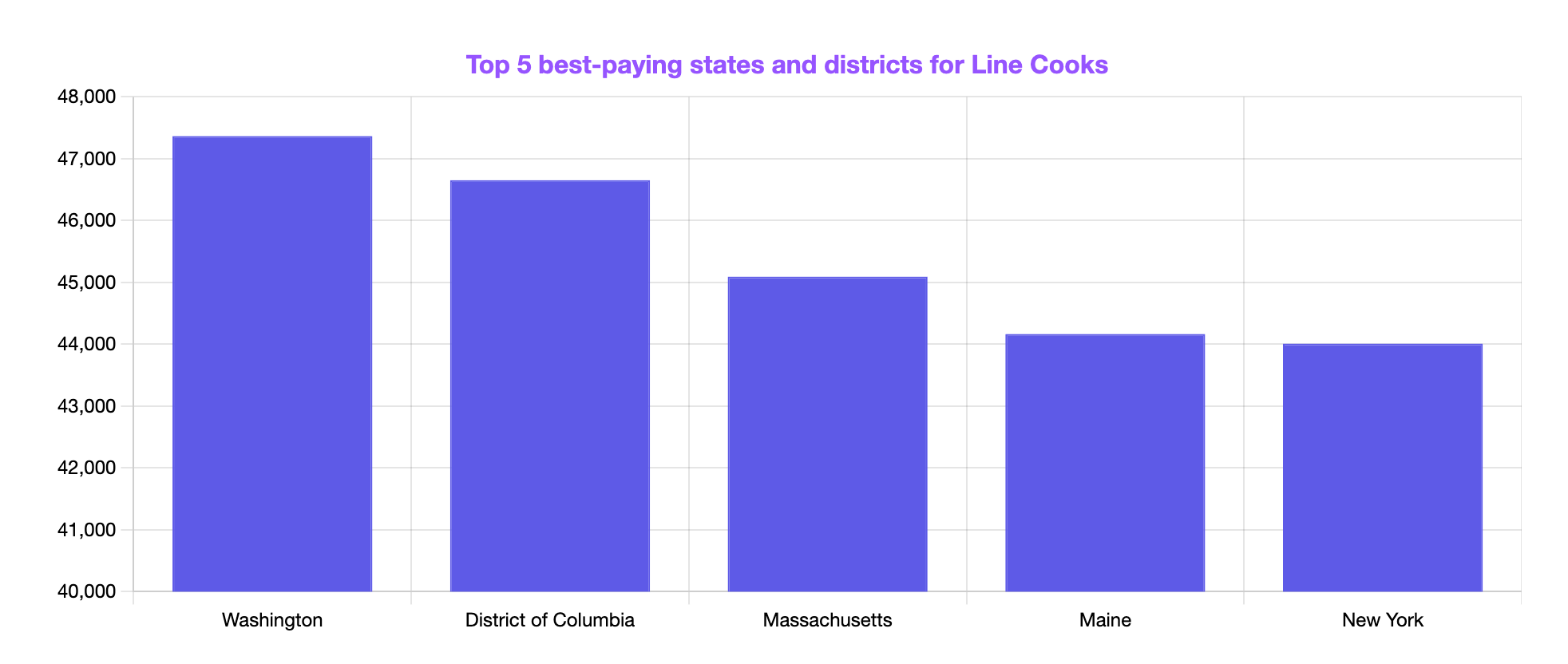Guide to a Line Cook Career
Are you looking to start a new career as a Line Cook? Then you've landed in the right place.
In this guide, we'll discuss the Line Cook's responsibilities, skills, requirements and earning potential.
We will also provide valuable advice on how to start your Line Cook journey and show you the path you can take to move up to better-paid positions in the restaurant industry.
What is a Line Cook?
A Line Cook, sometimes also called a Station Cook, is part of the kitchen staff.
They are responsible for executing food preparation tasks such as chopping, butchering and plating.
Line Cooks typically work under the supervision of a Chef, Head Chef or Sous Chef. In some establishments, they might work directly under the Kitchen Manager.
What Are the Key Responsibilities of a Line Cook?
A Line Cook job description includes:
- Washing, chopping, slicing, dicing, measuring and mixing ingredients
- Cooking dishes following established recipes
- Ensuring food is cooked to the correct temperature and consistency
- Plating the dishes to make them visually appealing
- Keeping the workstations clean
- Following food preparation safety standards
- Keeping track of inventory items and reporting any shortages of vegetables, meats and other consumables
- Coordinating with front-of-house staff for timely delivery of guests' orders
Top Line Cook Skills and Qualities
The best-performing Line Cooks typically have the following set of skills and qualities:
- Excellent culinary skills: Culinary skills needed for performing Line Cook day-to-day tasks include grilling, baking, roasting, sautéing and frying. Knife and plating techniques also fall under the same category.
- Attention to detail: This is an important trait for a Line Cook as they need to ensure every dish is presented well and follows restaurant standards.
- Time management: Line Cooks must organize their time well to be able to prioritize customers' orders during a restaurant's peak hours.
- Physical stamina: This line of work requires standing for hours at a time and enduring a high-temperature work environment. For this reason, physical fitness is one of the most important qualities a Line Cook can have.
- Effective communication skills: Line Cooks are in constant communication with other team members. To ensure smooth kitchen operations, they need good verbal communication abilities in order to follow instructions, ask questions and provide updates.

How To Become a Line Cook
Here is a step-by-step guide for becoming a Line Cook.
Learn basic culinary skills
You can start your journey by enrolling in a culinary school, a community colleague with culinary arts programs, or by taking online courses that teach basic cooking skills.
We'll cover the best culinary schools in the U.S. later on in this article.
Apply for entry-level positions
There is no better way to get familiar with kitchen operations than applying for entry-level positions such as Dishwasher, Prep Cook or Kitchen Assistant.
Being a part of the back-of-house staff will allow you to learn first-hand about the dynamics of the job. It helps you gain practical knowledge and develop essential skills such as time management, ingredient preparation and more.
Obtain a food handler certificate
Food certification programs are designed to train the applicants on the most important safety practices such as:
- Food safety hazards
- Controlling hazards
- Personal hygiene
- Proper food handling
- Safe food flow
- Pest control
Obtaining this certificate will put you in a better position to land your first Line Cook job as most commercial kitchens require their kitchen staff to have a food handler certificate from a reputable national organization such as the National Restaurant Association's ServSafe program.
Apply for Line Cook jobs
Get your resume ready and start applying for open Line Cook positions.
You can start by browsing our Line Cook jobs in the U.S. and Line Cook jobs in Miami and New York City.
Prepare for the job interview
Here are some steps you can take to increase your chances of nailing your next Line Cook job interview:
Research the company: It is always good to come to the interview prepared with some basic knowledge of the company you're interviewing for to show your enthusiasm for the role. Research the company's website and social media channels to get an idea of how they operate and what their unique selling point is. This will help you tailor your answers to their specific needs.
Get familiar with Line Cook interview questions: Practice answering some of the most frequently asked questions for a Line Cook job to help you relax and stay calm during the interview.
Dress to impress: When you show up for an interview, make sure you look presentable as 55% of a first impression is based on visual appearance. Explore our Spotlight article on what to wear and what not to wear on a job interview for more insights.
Best Culinary Schools in the US
Here is the list of the top five culinary schools in the U.S.
Line Cook Career Progression
As a Line Cook, you have an open door to some of the better-paid kitchen positions such as Head Chef or Executive Chef.
Line Cook Earning Potential in the US
Line Cooks in the U.S. make an average of $33,829 per year or $16.26 per hour.
Washington is the highest-paying state for Line Cooks, offering an average annual salary of $47,368.
